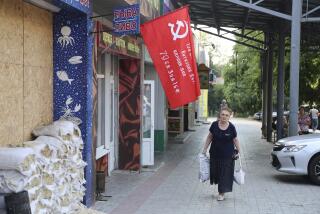Winners in Bosnian Elections Face Challenge: Taking Office
- Share via
SARAJEVO, Bosnia-Herzegovina — Not a single Muslim is believed to currently live in the eastern Bosnian city of Srebrenica. Thousands fled, or were killed, when Bosnian Serb gunmen seized the enclave more than two years ago in what human rights officials call Europe’s worst atrocity since World War II.
But, according to municipal election results released Thursday, Srebrenica has voted for a city council with a Muslim majority.
Victory by Muslim candidates in Srebrenica, and in several other eastern Bosnian municipalities purged violently of non-Serbs, was made possible because refugees were allowed to vote for governments in their prewar hometowns.
The results now set the stage for one of the most complex and volatile phases in the rebuilding of postwar Bosnia: forming local governments with members of the very ethnic groups that were expelled from cities made ethnically “pure” in the conflict. The task may prove impossible, international officials say. Resistance from the nationalists who continue to control such towns is fierce.
“Implementation of the election results . . . may not happen at all in the most problematic municipalities,” said a senior Western official involved in planning this phase.
One likely scenario, diplomats say, is that city officials will take office “in exile,” never able to cross the threshold of city hall.
If successful, however, the seating of mixed city councils would represent an important initial step in reversing the “ethnic cleansing” that drove hundreds of thousands of people from their homes during the 3 1/2-year war, mediators say. They hope it eventually will enable civilians to return home, a key provision of the U.S.-brokered peace accord signed 22 months ago.
“If [election results are] implemented, we see a unique opening for returning people home,” said Kris Janowski, spokesman for the United Nations. “If it remains simply on paper, it will disappoint a lot of people and will be a tragedy for the future of Bosnia-Herzegovina.”
Making the election results stick also will require a lengthened presence and enlarged role for NATO-led military peacekeepers, because only armed troops will be able to provide the security necessary for minorities to venture into enemy territory, diplomats say.
The potential new composition of local governments is so sensitive that international election officials are only gradually releasing results of Bosnia’s municipal vote, which took place Sept. 13-14.
In that election, thousands of banished Srebrenica residents--Muslims--voted by absentee ballot, and a small group was bused symbolically to a makeshift polling station a couple of feet inside the boundary of the Srebrenica municipality. They had to cross a rickety wooden bridge over a river to reach the place where they could vote.
The Serbs occupying the city also voted, but they were outnumbered.
According to results released Thursday, 24 of 45 seats were won by a predominantly Muslim political coalition, while the ruling Serbian Democratic Party--the party of former Bosnian Serb President Radovan Karadzic, who has been indicted on war crimes charges by an international tribunal in part because of what happened in Srebrenica--took only 12 seats. Another Serbian party, the right-wing Serbian Radical Party, was allotted eight seats, and an independent Muslim took the last seat.
In other Serb-held towns, like Vlasenica and Bratunac, the Muslim coalition won the largest number of seats but is outnumbered by any combination of Serbian parties. Only in Srebrenica do the Muslims have an outright majority.
Elsewhere in Bosnia, in the Croat-held city of Drvar, which was almost exclusively populated by Serbs until Croatian forces drove them into exile, results released Thursday painted a similar picture. Serbs who have struggled to be allowed to return home won 19 of 30 city council seats; the other 11 went to the staunchly nationalist Croat Democratic Union, which seized control of the municipality during the war.
Drvar provides a stark example of how implementing the election results may play out: In the two years since thousands of Serbs were “ethnically cleansed” from Drvar, U.N. officials have been able to restore to their homes only seven Serbian families.
On Monday, U.N. officials accompanied another 27 Serbs attempting to return to their homes in Drvar. They were met by off-duty Bosnian Croat soldiers and a drunk and “aggressive” Bosnian Croat who is the de facto mayor and who tried to kick out the Serbian homeowners, U.N. officials said.
Canadian NATO troops confronted the mayor, smashed the windshield of his car and spent the next couple of nights safeguarding the returning refugees.
More to Read
Sign up for Essential California
The most important California stories and recommendations in your inbox every morning.
You may occasionally receive promotional content from the Los Angeles Times.














